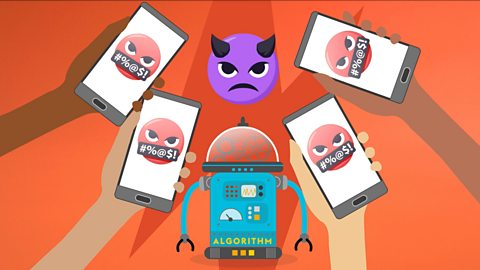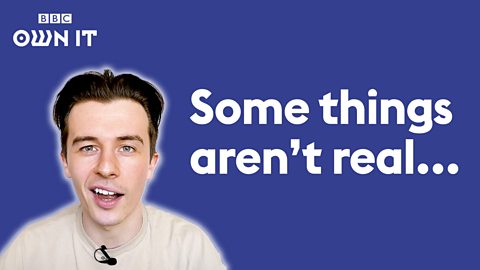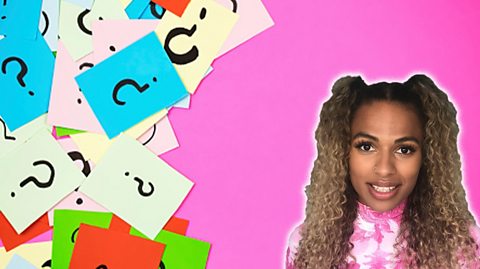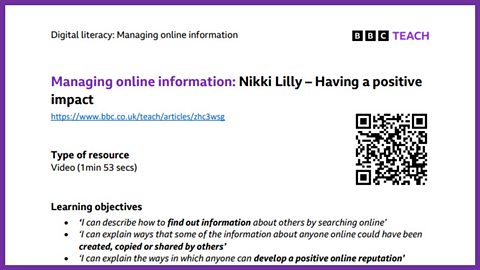Video summary
In the video, vlogger Nikki Lilly discusses about why itÔÇÖs important not to share personal information online, and talks about ensuring that whatever she posts has a positive impact.
She outlines good aspects of being online including staying in touch with friends and family, supporting each other through tough times, sharing some negative aspects or ÔÇÿconsÔÇÖ too ÔÇô cyberbullying, trolling, online hate.
She shares some ground rules for posting online:
- Think before you speak, treat others how you would like to be treated and be mindful of what you are posting
- DonÔÇÖt share your password or talk to strangers
- Setting your account to private
- If you havenÔÇÖt got anything nice to say, donÔÇÖt say anything at all.
Video: 1 mins 53 secs
Learning objectives
(from the set out by the UK Council for Internet Safety)
'I can describe how to find out information about others by searching onlineÔÇÖ
ÔÇÿI can explain ways that some of the information about anyone online could have been created, copied or shared by othersÔÇÖ
ÔÇÿI can explain the ways in which anyone can develop a positive online reputationÔÇÖ
Glossary
- Trolling: deliberately trying to upset, provoke or start a row online, usually by making many negative comments
- Self-esteem: how someone feels about themselves, how they value who they are and what they can do
- Filter: a digital tool that changes the appearance of a photo, often used to remove things that are thought of as negative and to change someoneÔÇÖs appearance before the image is posted online
- Mindfulness: paying close and careful attention to what you are doing
- Ground rules: an agreed set of rules for a particular situation, activity or place.
Topic introductions and starters
Before the video:
- Ask pupils to write down their current understanding of the key phrases and words from the glossary. This could be done individually or in pairs with some discussion.
After the video:
- Check understanding of the key vocabulary and correct any misconceptions
- Write down NikkiÔÇÖs key messages, either in small groups or as a whole class
Discussion Points
- What does positive impact mean? Do people all find the same things ÔÇÿpositiveÔÇÖ?
- Why is self-esteem important? Can you have low or high self-esteem? Can that change? How?
- Does looking different mean you should expect lots of comments about it? Should you have to discuss it with people?
- What is the difference between banter and trolling? When does one become the other?
- Do different people have different levels of tolerance for negative comments? How can we tell?
- Are NikkiÔÇÖs ground rules for online behaviour useful? Which ones work for you? Do you disagree with any? Why?
- Do you think Nikki will have had a different online experience to you? How would you cope with negative comments?
Fillers and fast finisher activities
- Look at the comments made on the video and write one of your own ÔÇô make it positive
- Write a transcript of NikkiÔÇÖs comments and put them into speech bubbles with illustrations - use either pencil and paper or digital presentation software
- Make a list of the positive and negative aspects of being online that Nikki mentions, and then add some of your own ideas to each list
- Work in pairs to explore what it might feel like to receive positive comments and negative comments ÔÇô use the role play to practise explaining the effect of positive and negative comments directly to the person who made them
- Role play a scenario where someone always posts filtered and artificially positive content. As their friends, ask them why they do it and encourage them to be more ÔÇÿrealÔÇÖ
Signposting potential homework activities
- Share the video with friends and family and discuss NikkiÔÇÖs experiences and her ground rules ÔÇô compare them to their own personal online rules
- Create your own list of ground rules like NikkiÔÇÖs and make them into a poster or leaflet
- Write an acrostic poem or article using POSITIVE as the first letters of each line.
More on: Managing online information
Why does the internet behave badly? video
A video exploring how algorithms work, and how to counter seeing nasty comments online.

What to do if you see something upsetting online. video
An article offering students tips and advice on what to do if they see something upsetting online

Regretting a post? HereÔÇÖs what to do video
Kemi Rodgers, Rio Fredrika and Lauren Layfield give their advice on what to do if you've posted something online you shouldn't have.

